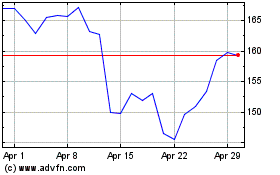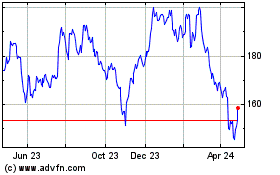By Richard Teitelbaum
Retirement wasn't in the cards for Paul Herendeen.
The former chief financial officer of drugmaker Warner Chilcott
figured it was time to kick back after helping engineer the sale of
the company in 2013 and a four-decade career in corporate
finance.
"I worked on my golf game," Mr. Herendeen said. "I realized I
didn't have a golf game."
So when investors emailed Mr. Herendeen, now 60 years old, about
an opening at Zoetis Inc., he was curious, despite having never
heard of the Florham Park, N.J., animal-health-care company. "I
threw my hat in the ring," he said.
Shares of Zoetis, which was spun off from Pfizer Inc. in 2013,
rose 1.9%, to $33.69 on Aug. 15, 2014, the day after the company
named Mr. Herendeen CFO. They closed Monday at $47.27.
Since joining Zoetis, Mr. Herendeen has cut costs, acquired
assets and faced off against activist investors, amid a wave of
mergers and acquisitions in the drug industry.
The Massachusetts native brought with him a reputation as a deal
maker, having helped sell his former company to Actavis--now called
Allergan PLC--for about $8.5 billion. It was his second stint at
Warner Chilcott, where he also was CFO from 1998 to 2000. In
between, he was finance chief of MedPointe, a closely held
health-care company.
Expectations for him are high in his current role. "We've seen
what Paul has done before," said Debbie Wang, a senior equity
analyst at research firm Morningstar Inc.
Mr. Herendeen is reshaping the company through a restructuring
program called "Zoetis Next," and predicts savings of $300 million
a year. For the third quarter of 2015, Zoetis had profit of $189
million on revenue of $1.2 billion.
The animal-health industry's robust growth was part of what drew
Mr. Herendeen, who owns two golden retrievers. The market is
growing by mid-single-digit percentages, and Zoetis is the largest
player, with $4.8 billion in 2014 sales. One rival, Sanofi SA is in
talks to swap its animal-health unit for Boehringer Ingelheim
GmbH's consumer unit plus $5.1 billion in cash.
Zoetis derives slightly more than a third of its sales from
drugs for domestic pets. Livestock health accounted for 65% of 2014
revenue, helped by emerging markets, where meat consumption is
increasing.
"You can look out into the next decade or two decades and see
growth drivers," said Mr. Herendeen, who plays hockey on a men's
league team called the Shamrocks. Unlike human pharma, animal
health is largely a cash business, with lower drug-approval hurdles
and less generic competition.
But there have been pressures. Barely two months after Mr.
Herendeen joined Zoetis, Chief Executive Juan Ramón Alaix summoned
him into his corner office. The CEO had just talked with William
Ackman, founder of activist firm Pershing Square Capital Management
LP, which was building a stake that recently totaled 8.4%,
according to FactSet.
"I wasn't excited one way or the other," Mr. Herendeen said of
the investment.
The goals of most activist investors--efficiency and wise
capital allocation--shouldn't faze CFOs, Mr. Herendeen said. "Those
are themes that should be embraced," he added. "There's a role for
activist investors keeping management teams on their toes."
Pershing Square struck a standstill deal under which Zoetis
named William Doyle, a member of Pershing Square's investment team,
to its board in February 2015. Another mutually acceptable director
was named to the board in April.
Pershing Square declined to comment on its Zoetis stake.
The detente with Mr. Ackman has bolstered Wall Street's regard
for the CFO.
"He doesn't get flustered," said Piper Jaffray & Co. senior
research analyst Kevin Ellich.
Mr. Herendeen has laid out his plans to Wall Street. "He was
able to explain the pathway for margin expansion," said Dan Lang,
head of the value team at RS Investments Management Co. who focuses
on health care.
As part of its restructuring, Zoetis has cut the number of
countries to which it sells directly to about 45 from 70,
jettisoning 25 that accounted for just 2% of sales. Management is
being thinned, and less-profitable lines sold. Overall, Zoetis is
projecting a 20% to 25% reduction in its head count of about 10,000
employees.
Mr. Herendeen is also squeezing efficiency out of research and
development. R&D costs fell 6% in the first nine months of 2015
to $255 million.
There seem to be results. Mr. Ellich estimates that Zoetis's
gross margins ticked up in 2015, to 65.1%, and foresees more growth
this year. He also estimates that operating expenses declined 7.8%
last year.
Zoetis spent $255 million in November 2014 to buy some
animal-health products from Abbott Laboratories Inc. Last November,
it spent $765 million to buy Norway-based Pharmaq AS, which makes
fish vaccines.
But the company isn't just cutting and buying its way to growth;
its drug pipeline remains healthy. Simparica, an oral flea and tick
treatment for dogs, was recently approved for use in Europe and
could generate sales of more than $100 million a year if cleared in
the U.S., says Mr. Ellich.
(END) Dow Jones Newswires
January 04, 2016 19:58 ET (00:58 GMT)
Copyright (c) 2016 Dow Jones & Company, Inc.
Zoetis (NYSE:ZTS)
Historical Stock Chart
From Jun 2024 to Jul 2024

Zoetis (NYSE:ZTS)
Historical Stock Chart
From Jul 2023 to Jul 2024
